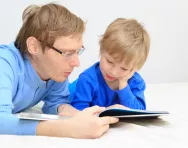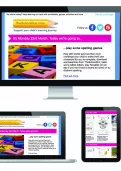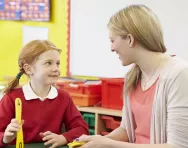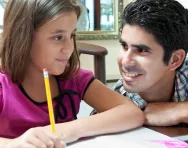Important update from TheSchoolRun
For the past 13 years, TheSchoolRun has been run by a small team of mums working from home, dedicated to providing quality educational resources to primary school parents. Unfortunately, rising supplier costs and falling revenue have made it impossible for us to continue operating, and we’ve had to make the difficult decision to close. The good news: We’ve arranged for another educational provider to take over many of our resources. These will be hosted on a new portal, where the content will be updated and expanded to support your child’s learning.
What this means for subscribers:
- Your subscription is still active, and for now, you can keep using the website as normal — just log in with your usual details to access all our articles and resources*.
- In a few months, all resources will move to the new portal. You’ll continue to have access there until your subscription ends. We’ll send you full details nearer the time.
- As a thank you for your support, we’ll also be sending you 16 primary school eBooks (worth £108.84) to download and keep.
A few changes to be aware of:
- The Learning Journey weekly email has ended, but your child’s plan will still be updated on your dashboard each Monday. Just log in to see the recommended worksheets.
- The 11+ weekly emails have now ended. We sent you all the remaining emails in the series at the end of March — please check your inbox (and spam folder) if you haven’t seen them. You can also follow the full programme here: 11+ Learning Journey.
If you have any questions, please contact us at [email protected]. Thank you for being part of our journey it’s been a privilege to support your family’s learning.
*If you need to reset your password, it will still work as usual. Please check your spam folder if the reset email doesn’t appear in your inbox.
Coping with speech and language difficulties in mainstream school

Being able to understand what is said to you and communicate with others is an essential skill for all of us.
Some children, however, struggle to both understand and use language. This can have a huge impact on how they learn, make friends and cope with school.


Start a unique learning programme!
- Weekly programme for each school year
- Worksheets sent direct to your inbox
- Keeps your child's learning on track
Some 10% of children – that’s about three in every classroom – have a language disorder that they won’t grow out of.
In some parts of the UK, much larger numbers of children struggle with learning because they have delayed language. In some disadvantaged areas, this can be up to 50% of children.
Speech, language and communication needs are over seven times more common than autism, but teachers and parents can still struggle to understand how to help.
How speech and language difficulties affect children at school
Problems with speech, language and communication can affect children in many ways:
- Poor speech can mean that other children and adults struggle to understand the child.
- Even quite minor difficulties with certain speech sounds can make learning to read using phonics hard, and passing the Year 1 phonics screening check may be a challenge.
- Children who struggle to understand spoken language may have problems following instructions and grasping what lessons are about.
- Children and adults can become frustrated with their lack of understanding.
- A limited vocabulary and sentence structure can hold children back in their reading and written work.
- Children can struggle to make their needs known at school.
- Making friends can be difficult.
So what can be done to help children with speech and language difficulties cope with mainstream school?
1. Use visual support
Using pictures, symbols, written clues and prompts in the classroom can really help children with communication problems, as they’re a more lasting reminder than the fleeting auditory signals which make up spoken language.
Teachers might use visual reminders of things like ‘what we need to do to help us listen’ to focus children on what the teacher is saying.
A visual timetable of the sequence of activities that happen during the school day can also be of great help to children. You can use these at home, too, for things like their morning and evening routine.
2. Focus children’s attention
Saying the child’s name and even lightly touching them on the arm can help focus their attention and cue them in to what the teacher is about to say.
For younger children, getting down to their level and making eye contact when you speak will also engage them.
Ask other parents for advice, too: they may have found a good way of securing their child’s attention at home, and it could be helpful to use the same strategies to help them thrive in the classroom.
3. Make the classroom ‘asking friendly’
Often, children with speech, language and communication needs don’t realise when they haven’t understood something the teacher has said.
Making the classroom ‘asking friendly’ can help. For example, children can be encouraged to repeat back what they’re meant to be doing to check they’ve understood.
With their teacher’s help, you can also explicitly teach your child simple words to explain if they haven’t understood something, such as ‘help,’ ‘I don’t know’ and ‘say it again.’
Some teachers ask children to use a thumbs up/thumbs down gesture as a quick way of seeing who has and hasn’t followed what they’ve just heard: a strategy you might want to try at home, too.
4. Prioritise reading at home
Being able to produce a piece of written work relies on more than just being able to write the letters and join them up on the page.
You can’t write a story unless you can tell a story, and some children need lots of practice to achieve this.
Reading out loud at home, helping them to think about the text, and asking questions like ‘why?’ and ‘how do you know?’ will help your child understand what they have heard and read, as well as showing them how to structure ideas into sentences.
5. Focus on vocabulary
The number of words children know is a hugely significant indicator of how well they will do at school, from Reception right through to the end of secondary school and beyond.
Some children start school with very few words, and they then struggle to learn new words.
For example, if a child knows all the names of domestic animals when they start school, they’ll find it easier to learn and remember the names of more exotic wild and zoo animals.
Likewise, if they have lots of words for emotions in their vocabulary, they’ll find it easier to talk about how they feel and manage their friendships and relationships.
Help your child build vocabulary by reading lots at home, talking to them about what you’ve read or watched on TV, and naming unfamiliar objects that you see around the house or even out and about in the supermarket.
6. Know when to seek help
For some children, speech, language and communication are such a challenge that they need specialist help and support in order to cope with school.
Speech and language therapists have the specialist skills to assess and identify where a child is struggling, and to work with schools and parents to support them.
If you’re concerned about your child’s speech, language and communication, you can ask for a meeting with their teacher and the school’s special educational needs coordinator (SENCO) and request a referral to your local speech and language therapy service.
I CAN, the children’s communication charity, has produced a range of resources and services to support children and their families. Visit www.ican.org.uk for more information.








